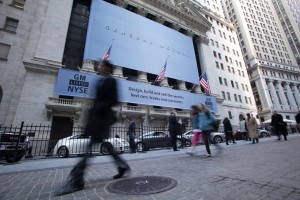General Motors’ eagerly-awaited Initial Public Offering is now on track to be the largest first-time stock sale in history.
The maker, which only emerged from Chapter 11 protection 16 months ago, now estimates the public offering of common and convertible junior preferred stock will raise between $20.1 billion and $23.1 billion if the underwriters’ over-allotment options are fully exercised.
“As we prepare to enter the equity markets, all of us at GM are excited about this historic milestone. We are especially appreciative of those who stood by us through the toughest times, and we are dedicated to creating value for all of our stakeholders,” proclaimed GM Vice Chairman and Chief Financial Officer Chris Liddell, finally breaking the SEC-imposed silence hours before the maker’s stock offering was set to go on Thursday.
Initially taking a conservative approach, GM intended to price the opening shares at $26 to $29 – even then exceeding the guess of its more conservative underwriters. That would have raised between $10 billion and $12 billion, with the U.S. Treasury – the largest stakeholder – reducing its holdings from 60.1% to around 40%.
But going into the final days before the IPO it became clear demand had far exceeded expectations, leading GM and the government to agree to expand the number of shares on the block by a third – to 478 million – and at a boost price of $32 to $33 each.
The mandatory convertible junior preferred stock portion of the offering, intended to raise cash for GM itself, was bumped up from 60 million to 80 million shares.
The underwriters have a 30-day option to purchase up to 71.7 million additional shares of common stock from the selling stockholders, for a total of $2.37 billion, and an additional 13 million shares of mandatory convertible junior preferred stock from the company on the same terms and conditions, for a total of $650 million, to cover over-allotments.
That means GM is well-positioned to raise more than the $19.7 billion garnered by Visa’s 2008 IPO, the biggest ever. Meanwhile, the potential loss to the Treasury of $5.4 billion at the original low of $26 per share now appears likely to be significantly reduced.

